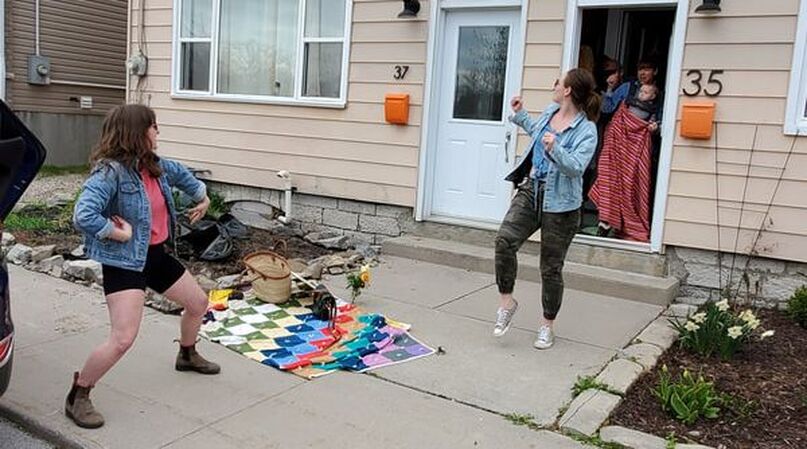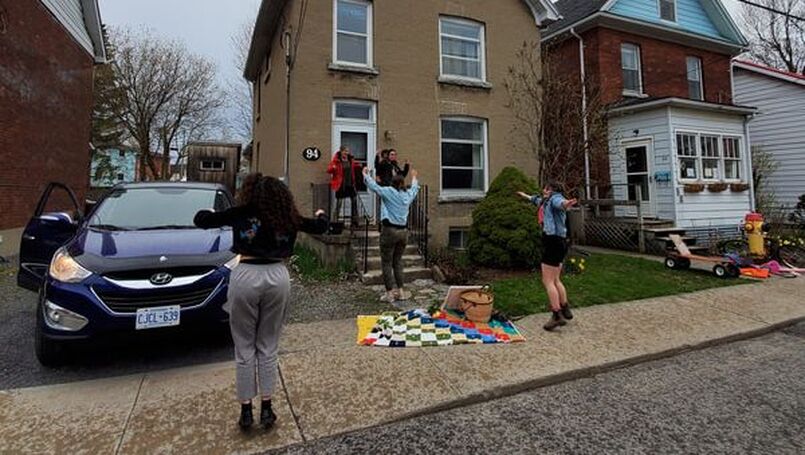|
Audiences are well acquainted with the meal that comes out of the bourgeois theatre recipe: we pay $30 for a ticket, sit in the dark, and in return we are collectively moved, challenged, entertained and inspired by a live performance. New questions about this exchange come into play in the context of participatory works. Because many of the artists we’re musing over in the play/PLAY project are asking more of their participants in reception, shouldn’t participants get more in this exchange? If artists need my audience labour to co-create this piece, what do audiences get in return? Am I paying $25 to make your show with you? What are the expectations, on both sides, of this exchange? Before the pandemic, participatory artists were already manipulating this exchange, giving tangible and intangible offerings to their participants in exchange for additional audience labour. Good Thing Collective’s Good Things to Do offered a meaningful demo in self care in exchange for a crowdsourced list of good things to do. Lost Together gave you a craft as a tangible memory of something you lost if you were vulnerable enough to share. Bonjour Hi paid participants real money if you made them sandwiches or folded their socks. In B-Side, if you placed a lemon, you got lemonade. However, amidst the pandemic, these tangible offerings are harder to extend across the fourth wall. It’s harder to give and harder to get. So what if instead, the artist offers me love? Not the abstract kind of love that I may feel from my seat in witnessing a bourgeois play or actual money like in Bonjour Hi, but actual personalized love. A real gift from them to me, specifically. In the wake of the pandemic, many participatory artists are centering on this different kind of gift giving. These are not substantial or material gifts, but small, personalized, tailor-made moments of intense and genuine intimacy (in form and content) between participant and artist. “I see you.” “I love you.” “This is for you.” Me, specifically. In Convergence Theatre’s pandemic phone-play series The Corona Variations, each of the short plays ended with an actual exchange of “I love you” between performers or between participants and performers. In some instances, as a listener, you’re a fly on a wall listening to two actors mend a dispute. Sometimes, like in a vignette by clowns Morro and Jasp, artists reach through the phone to say “I love you Mariah”. Like The Corona Variations, many of the live participatory performances we have witnessed during the pandemic dramaturgically manipulate this exchange as a gift of individualized love. In order to give real personalized love, these artists use various techniques to build a genuine one-on-one relationship with participants. They get to know the participants by asking for autobiographical details. They tell secrets of their own before they ask participants for theirs. Many performances up the intimacy level by using the phone. Without a face-to-face visual, the voice is very intimate. A phone call isn’t spatialized as much as it’s embodied. It’s so close to your body it’s in your mind. These dramaturgical techniques build relationships that leave space for giving and receiving an actual gift. In early May, I brought this sensibility to my own work as a site-specific theatre maker in a new piece by Cellar Door Project called To You. Created with Laura Chaignon and Kay Kenney, To You is a surprise birthday party disguised as a pop-up porch performance piece. We picked twenty households in the neighbourhood that we wanted to love bomb and we showed up on their porch to throw them a surprise party. We offered a pothos plant as a gift. We made cupcakes that we offered to participants but then ate them ourselves instead (#pandemicproblems). We danced to Whitney Houston together. Each performance began with a personalized story of the first time I (as Mariah) met the participant in real life. We relied on pre-existing relationships to build a more intimate relationship within the piece because in order to really give a good gift, you need to know the person receiving the gift. Although the driveway was a less intimate space than a phone call, embarrassing yourself on your street dancing to Whitney with a real friend is a real vulnerable moment.
In Outside the March’s episodic phone play Mundane Mysteries, the artists build this friendship from scratch. In the first phone call from the Ministry of Mundane Mysteries, your “inspector” asks you a series of random questions to get to know you before they solve your mystery. Besides the week of silly and playful antics, at the end of the experience, they too offer listeners a personalized gift. For some context, anyone who knows me knows that I’m a real firebrand when it comes to dismantling patriarchal power structures. I told my inspector this off the top. At the end of the final episode of the phone play, after she had solved my mystery, my inspector told me she found herself questioning the system she was working within. She wanted to imagine a Ministry that was run entirely by women. I asked her if she was an anarchist and she laughed. This final dramaturgical push towards the radical feminist agenda really solidified this feeling that this show was made...specifically for me. The show used my dialogue to fill-in-the-blanks like mad libs, but it also thematically intertwined with my own politics. At the end of the phone call, she thanked me for empowering her. Cue serious warm fuzzy feeling. When Erin Hurley charts out the path from affect to mood to emotion to feeling in her book Theatre & Feeling, she says “emotions are relational: fear lies between the person and the bear.” Although physical distancing forcibly inserts uncrossable distance between participants and “the bear” (the art or the artist), these meaningful, personal and individualized gifts of love cross the space between. Although intangible, these artists are offering intensely personalized and genuine love notes in return for playing along. Like Hurley says, “feelings are stimulus responses and that they extend our perception beyond our own body and it's situation” and in this case, connecting us to a greater community that is apart, but together. Pandemic quarantine places strict limits on our body and its situation so feeling special and signalled out and loved is a gift.
2 Comments
Tanya
6/22/2020 06:57:05 pm
I would be lying if I said I was a theatre enthusiast. While I attend anywhere from 3 to 5 performances a year, (perhaps more than the average Joe), I can't say I'm often moved, immersed, or impacted by what I've seen. And as I say that, I wish it wasn't the case. I wish I could really dive in to theatre the way people in my community do. This isn't to say that the performances aren't good, or even brilliant. For the most part, I'm entertained. But as you mentioned, the bourgeois theatre recipe is a standard exchange- the kind we have traditionally come to expect from theatre- and it simply doesn't resonate with me most of the time. I suspect the art of theatre in the traditional sense is lost on a lot people as a result of this defined format.
Reply
1/21/2022 05:00:36 am
Very much appreciated. Thank you for this excellent article. Keep posting!
Reply
Leave a Reply. |


 RSS Feed
RSS Feed
